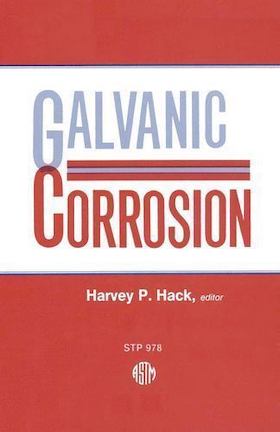
Curated with aloha by
Ted Mooney, P.E. RET

The authoritative public forum
for Metal Finishing 1989-2025

-----
Solving an electrolysis problem in home plumbing
Q. ALOHA, fellow Great Americans. #1 ElectroDefence? If I was to put a good ground wire on everything -- all the pipes, softener, filter, hot water tank (everything) would electrolysis be reduced or get worse? We get really hard water high in iron from town.
Thanks, I then can get back to living the good life. NEVER UNDER ESTIMATE HUSKER POWER. GO BIG RED
p.s. how do I clean water heater beads inside of it.
- Norfolk Nebraska USA
January 17, 2023
⇩ Related postings, oldest first ⇩
Q. Over the past 15 years we have had 4 leaks in the same cold water plumbing line. In each case the hole was about the size of a bb when we fixed it. During the repair of the latest leak, the plumber said this could be caused by electrolysis. How can I confirm this and how can I stop it from continuing? The plumber said the pipe run leaks at the point of greatest weakness (or thinning) and that this run may have to be replaced to keep from having more leaks. The plumbing is over 30 years old in our house.
Bill LuisiHomeowner - Carrollton, Texas
2004
A. What the plumber may be alluding to is the fact that galvanic corrosion occurs may occur if dissimilar metals are connected together in a plumbing system. I saw a "handyman" TV show a few nights ago where the plumber installed dielectric unions to solve this problem. These are basically just unions that have plastic washers and bushings that prevent electrical contact.

Ted Mooney, P.E.
Striving to live Aloha
finishing.com - Pine Beach, New Jersey
Q. I have had an electrolysis problem for several years. It's always at the hot water out pipe on the water heater. The house has mostly copper pipe. I've used dielectric unions between the copper pipe and plastic coated steel nipples, to no avail.
This is our third water heater. I've asked some well informed plumbing sales people at the local hardware stores, and they don't have an answer for me.
- San Bruno, California
2004
A. Check your anode rod in you water heater. Part of its purpose is to absorb stray current. It will deteriorate sacrificially instead of the copper pipes. That being said, in a house with current on the pipes, the anode rod can be dissolved within 6 months or more.
If you can, get an ammeter that can read both AC and DC. DC is the big destroyer of the metal. Many claim AC doesn't harm the metal, I'm on the fence...
Once you have your ammeter on your hot water pipe (and it's showing AC or DC current), go to your electrical panel and open (turn off) the main breaker for your house.
Does the meter still show current? If not, turn off all of your breakers and turn the main back on. Check meter again at that point (a ground fault could be the problem if it shows current). If it shows no current, turn each breaker back on one by one and check the ammeter (still clamped around the hot water pipe) every time you turn a breaker on. You can then find the problem circuit.
If when you open the main breaker current still remains. There is an outside source causing capacitive coupling/induction.
Chances are, since it's ONLY on your hot water side, an anode rod will fix it or it's an internal appliance that is tied to the hot water causing it.
I hope that helps.
Electrician - Colorado
October 24, 2024
Q. Can electrolysis be caused by continued movement of water as caused by a circulating pump? If there is salt in the water will it cause thinning of copper piping? Would there be problems if plumbing were of PVC? There is a natural gas water boiler on the project, will the induced dc on the gas line cause problems?
Thanks,
- San Saba, Texas
2006
Q. I am having the same questions you have submitted. Could you let me know what you did to solve the problem?
Thanks,
- Albuquerque, New Mexico
2006
A. Electrolysis is defined as "the decomposition into ions of a chemical compound in solution by the action of an electric current passing through the solution." For example, electrolysis occurs when a battery corrodes. Electrons move between two dissimilar metals via a solution high in total dissolved solids (TDS).
How is electrolysis caused by bonding to the plumbing system? For a home supplied by well water, electrical wires are grounded to the well casing. Electricity travels through the plumbing on its way to being grounded. Electrolysis occurs when two dissimilar metals that make up a home's plumbing system conduct this electricity.
For example, if a system contains both copper and galvanized steel piping, the electricity will jump to the copper piping more readily because of its higher conductivity, traveling easily through the highly conductive water. When the electricity enters or leaves the pipes, it can cause random and inconsistent arcing, spitting, scaling and spotting as it makes contact with the wall of the pipe.
The same effect can occur when static electricity grounds to the plumbing system. As air moves through heat ducts or cold- or hot-air runs, static electricity builds. Pipes that run through these ducts or touch these runs may serve as a ground for static electricity. Left unchecked, arcing can eat through pipe walls.
One way to prevent static electric grounding is to wrap the pipes in electrical tape where they come in close contact with the air ducts. This will insulate them from a direct connection with the static electricity and prevent grounding through the plumbing system.
- WaterTechOnline
I was doing research on electrolysis and I checked this out. Seems like electrical tape is the answer.
home buyers protection service - Canyon Country, California
Q. My Mother-in-law has had 4 leaks in the last 3 years, the copper lines run under the slab packed in sand. At first we thought it was rocks puncturing the line in the shifting sand. She has kept all the parts that have been repaired and showed them to the city of Richardson inspector who advised it was from electrolysis. The pipe walls are not thin and show signs of oxidation from the inside. The house is not more than 10yrs old. We do not have an option to wrap these pipes with electrical tape as they are under the slab.
My question is whether an electrode or ground or another piece of metal like zinc could be attached to the copper pipe in order to reduce current passing through the copper and stop electrolysis. My uncle had bolted a bar of zinc to the frame of a 1932 pick up in order to reduce oxidation of the vehicle. Could this principle be applied to copper lines to reduce electrolysis?
- Richardson Texas
August 12, 2008
A. Hi, Eric. A sacrificial zinc anode will be effective in reducing natural corrosion, without wearing out quickly -- but this doesn't sound like natural corrosion. It sounds like the pipes are inadvertently carrying electricity. I think putting insulating dielectric unions on them will be effective in stopping the corrosion.
Regards,

Ted Mooney, P.E.
Striving to live Aloha
finishing.com - Pine Beach, New Jersey
Q. We recently received a note on our door from a plumbing company regarding potential electrolysis of our plumbing. A neighbor had problems with leaking pipes due to electrolysis caused by wire hangers instead of copper strapping. The neighbor identified our house as being one of 5 other homes built by the same builder. The plumbing company offered a free inspection to check what our pipes were hung with. It seems we have both copper strapping AND wire hangers therefore according to the plumber we have electrolysis and need to have our entire house replumbed. We do not have any pipes that are leaking so why can't we just replace wire hangers with copper strapping instead of entire replumbing?
Sheri Whitmanhome owner - Boring, Oregon
September 27, 2008
A. Hi, Sheri. I would take the note to the town's building department and see what they say. Yes, galvanic reactions are real, and the plumber could be okay. But it doesn't smell right.
Regards,

Ted Mooney, P.E.
Striving to live Aloha
finishing.com - Pine Beach, New Jersey
Q. We recently had another leak repaired under our slab floor. This is the second time within a two year period. The plumber replaced a section of copper pipe each time. The latest section had green oxidation in many places. The plumber said it is Electrolysis eating at the pipe. He suggested to have an electrician check our power netural ground and if grounded to the cold water pipe, remove it and install a ground rod. Your Thoughts?
The house is in the country and approximately 30 years old. By the way I'm retired from a phone Company. Do you have ay idea how many protectors we have installed to a cold water pipe in the Dallas area over the years? To many to list!
Thank You For Your Advice
hobbyist - Paris, Texas
May 18, 2009
Q. Re: electrolysis can you help? In a 12 yr old addition to my 1780's farmhouse (plumbed in 1978) I am experiencing-=only in the new addition-- recurring leaks on the "hot water side" of a "boiler mate" type heat exchanger to which is connected a constantly running circulator pump (plugged into a grounded outlet)that feeds our master bath which includes a Jacuzzi tub where the jacuzzi pump motor
(plugged into a grounded fault interrupter) is additionally grounded to the copper pipe which feeds the tub. (NOTE: the jacuzzi is not used very often).
The plumbing installed in 1978 has thus far show no signs of any problem. Since 1978 I have used a water softener for hardness and recent tests show my ph is "right on."
My electrical system is grounded from the electrical main panel to a solid 8' copper rod. My water system is also grounded to an 8' solid copper pipe at a fitting inside the house where the pipe comes in from the submersible pump in the outside deep well (also grounded with a lightning arrester at the main electrical panel.)
These dielectric fittings you mention--how would they interrupt electrolytic current flow from fitting to fitting if the current can bypass the fitting by way of the water in the pipe? (Seems, years ago, I recall the swimming pool contractor arguing this point with the building inspector as it applied to grounding the stainless steel filter tank separately from the rest of the pool filter system. "As long as there is water in the pipe/tank, and the rest of the system is grounded, the tank should be grounded by rote."
My plumber suggests: either I had a slew of bad 1/2 in copper pipe fittings (early Chinese) associated wih the new addition (1996) plumbing or with the sanction of an accredited electrician might consider removing the Jacuzzi pump ground from the copper pipe.
I would appreciate your thoughts and thank you in advance for your help.
- Alburtis, Pennsylvania
September 28, 2009
A. Hi, Pete. Careful choice of words is necessary if we are to understand each other, so I avoid the term "electrolysis" because it can cause us to misunderstand each other.
There are two problems mixed together in these discussions:
First, if dissimilar metals are used in a piping system, galvanic corrosion can occur even when no electrical devices are attached. The same principle that makes batteries work makes a battery out of a piping system with two different metals. Say you connect copper pipe to galvanized pipe. For battery/electrochemical reasons that it isn't really necessary to understand, electrons will try to flow from the copper pipe to the galvanized pipe. To balance the charges, this will cause some of the copper to dissolve into the water as positively charged ions, migrate through the water, and rejoin the electrons, and copper will deposit on the galvanized pipe. This copper came from the copper pipe, so it's a problem. If you install a dielectric union, it's just like turning off a switch on a battery operated system -- the electrons stop flowing. Dielectric unions are for the purpose of stopping these galvanic currents, and they work.
But secondly, electrical currents can come from external electrically operated devices, and flow through pipes to ground. And when they do, this can cause corrosion. Dielectric unions may confuse this issue without solving it. If you use ground fault detectors in your electrical supplies and do not ground the circuits to piping you shouldn't have such problems. But if you have old wiring that connected grounds to piping, and you add dielectric unions, you'll lose that ground (which may be dangerous and against code), and who knows what weird currents will flow and where :-)
Regards,

Ted Mooney, P.E.
Striving to live Aloha
finishing.com - Pine Beach, New Jersey
A. I resolve EMF on water lines in the home, and I do this often for a wide range of people. For anyone installing dielectric unions on water lines - PLEASE READ THIS! As per the National Electric Code (NEC), it has been a requirement to ground home electrical service panels to the waterlines as a "backup" ground for your electrical system. If you break that electrical connection with dielectric unions on the incoming water lines then YOU ARE PUTTING PEOPLE AT SERIOUS RISK OF ELECTRICAL SHOCK AND/OR STRUCTURAL FIRES! You must replace that backup ground by installing ground rods and connecting them to the service panel FIRST! EMF is a serious issue for people with Lyme disease, it can cause serious health issues, and it is much more prevalent than people realize.
Gerry McDonald- Roseville, Minnesota
November 6, 2011
Q. We just installed a new gas water heater and for 2 weeks our customer complained of excessive air in the hot water pipes throughout the house since the new install. we have city water and no booster pumps or lawn irrigation system. after several tests that failed to expose the problem.. we removed the magnesium anode rod and found it was about 25% eroded in less than 2 weeks. we replaced it with an aluminum anode rod and so far no more air (2 days) our customer wants to know why the magnesium rod was having such and aggressive reaction of rapid disintegration which was causing the air or gases in his system. could this have been caused by electrolysis or an excessive electrical current through the anode rod from the ground being attached to the copper water line?
Jeff Anopolskyplumbing service manager - Farmington, Connecticut, USA
May 12, 2010
A. You guys all have interesting insight, especially Mr. Mooney. But not all electrolysis issues involve dissimilar metals. When I worked on petrochemical plant construction in Saudi Arabia the underground piping plans called for pipe to be coated and wrapped. Two wires were laid in the pipe trench to carry a low voltage electrical charge next to the wrapped pipe to minimize electrolysis of the pipe. Like that plant, my house is near the ocean. We have copper plumbing. There are no dissimilar metals involved yet we've had to repair multiple copper hot-water leaks under the house. The copper pipes were installed 'on the ground' like a slab foundation yet we have a raised foundation so we had the pipes replaced and hung under the floor joists above the ground. Guess what? More leaks. The plumber said the new pipes have turned red in just three months. A hospital building superintendent suggested an electrolysis issue and guess what? I checked the hot water heater just moments ago and found that the water supply line has an electrical ground attached to it on the down stream side. I intend to remove the ground wire from the copper pipe and attach it to a copper rod I will install in the ground. My guess is it will stop the leaks.
Craig Sink - Construction Inspector- Long Beach, California
November 20, 2011
! Thanks Craig.
I just run the website, but I don't like to leave questions unanswered because I feel it is discourteous to ignore people who have taken the time to post. So, if no one else answers promptly, I try to respond in some fashion ... but I certainly don't claim to be an expert on this topic and every topic on the site :-)
So I greatly appreciate when people with experience like Garrett and Gerry and yourself help out.
Regards,

Ted Mooney, P.E.
Striving to live Aloha
finishing.com - Pine Beach, New Jersey
Q. I have had 4 slab leaks in the past two years on my cold water copper lines. In each case the leak was in the slab. The copper pipes in the slab are covered with a black plastic ribbed conduit. The house is 15 years old. The plumber indicated the plastic conduit was above code standard at the time of installation. He also said they are finding out that the leaks may be caused by static electricity building up in the pipes. Is this likely? If so, what can be done to stop the static electricity build up?
George Powellretired - San Antonio, Texas, USA
July 10, 2012
A. I did not remove the electrical ground from my hot water pipe and place it on a rod as I stated I would in my last post. I was wrong. There were dissimilar metals involved. The nipples on my hot water tank are galvanized, the hot water tank is probably an iron tank, and I had the entire copper system attached to the steel nipples with copper flex hoses; dissimilar metals. I placed dialectic unions between the copper flex and the steel nipples on the hot water heater and we have not had another pin leak in a year.
Regards Craig
- Dana Point, California, USA
November 14, 2012
Q. I have a tri-level house on city water, built around 1975. All copper plumbing. Over the 20 years that I have been here, I have probably repaired a dozen or so water leaks, and in each case, the copper looks like it is being eaten from the inside. Thin, dead-sounding pipes (no ring when you tap them), sometime the section of pipe that was inside the sweated joint is paper thin or has holes through it. The worst was a leak I had just my side of the city shut-off, buried 5 feet down under the corner of my driveway! When I dug it up, I found an oblong, 1/4" hole through the pipe, right next to a solder joint. Why is this happening, and what can be done about it?

- Mishawaka, Indiana, USA
January 23, 2013
Q. Hello all,
I read through this thread and have learned a lot. I believe I have the same issue and my question is about what to do next...
First some brief background. I moved into a townhouse in Westchester county, NY in June 2012. The complex is 18 years old. Since I have moved in, the water main from the street to my house has had 3 leaks (1 in June, 1 in November, 1 this week). I have also learned that it happened once before, about a year before I moved in.
Basically what happens is the water comes through the pores of the driveway, or creates cracks. This builds up, and then my driveway has a huge portion ripped up and the pipe is repaired. Each time now, the pipe has a small hole, and looks corroded on the outside of the pipe. This is a cold water line. The electrical line to the house is fairly close I believe, to this line. Since the complex is fairly new, I am pretty sure everything is type K copper, but I do not know how this attaches to the main in the street.
There is a valve in the middle of my driveway. On the street side of the valve, the town is responsible. On my side, I am responsible. In the nine months so far, two have been on the town side, and one has been on my side (cost me 4k).
I can't have this become a constant occurrence. I feel like the town is just putting band aids on the real problem, plus my driveway is full of patches now. Who is responsible for this? If I want the problem fixed for good, do I go through the town, the electric company, insurance? I read above that one option is to install dielectric unions between the pipes and then a metal rod is buried underground to ground to, and preserve the back-up ground for the house. Is there another option?
Also if arcing is taking place due to electricity being built up, is the corrosion occurring because my pipe is not grounded? Or is it because it is grounded, but just not properly?
I can't afford another repair of this magnitude, and I don't understand why I would be responsible to do so, since something was not done up to code either on the electrical or the plumbing side of things. Are builders ever responsible or only for X amount of years?
Here are a few images of the pipe, and of what has happened:
How it starts, Two days later, Pit Dug in Driveway, Corroded Pipe --
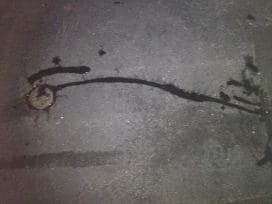
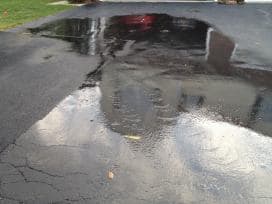
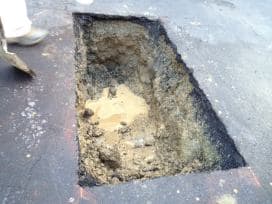
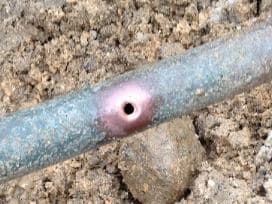
Timeline --
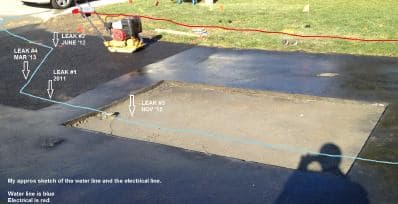
Thanks very much for reading.
Dan
- Tarrytown, New York, USA
March 6, 2013
Q. Hi. My house is 50 years old and I never had any plumbing issues. 8 years ago I had my oil burner changed, over the past 4 years I have had 7 leaks and many of the pipes are turning green with corrosion. I was wondering if a possible grounding issue with the new burner could be causing this electrolysis condition.
Jerry Rutino- Hicksville, New York
May 20, 2013
A. Hi Jerry. But you went 4 years after the installation with no problems? Unfortunately, while you tried to give some information about your situation, it's still a bit ambiguous to me. When you say "oil burner", you do mean the whole furnace, or just the atomizer and igniter? Do you have a hot water heating system, and the hot water piping is made of copper, and that is what you are referring to? Or is it the water supply piping that is getting leaks? Are joints breaking or are the leaks from pinholes? Thanks!
Regards,

Ted Mooney, P.E.
Striving to live Aloha
finishing.com - Pine Beach, New Jersey
Q. I was wondering if you had a PVC fitting between the galvanized union and the copper pipe does that act as a dielectric.
Alan Besbeckhomeowner - Woodland Hills, California, USA
June 16, 2013
A. Hi Alan. A PVC fitting probably doesn't comply with code, and the reason they probably worry is that the coefficient of thermal expansion of plastic is so much higher than that of metal (i.e., if it fits nice and tight when cold, it might fit too loose and leak when hot). So a dielectric union is a better plumbing fitting.
But to directly answer your question, yes, any non-conductive material that prevents metal to metal contact, including a PVC fitting, acts fine as a dielectric.
Regards,

Ted Mooney, P.E.
Striving to live Aloha
finishing.com - Pine Beach, New Jersey
1 2
Q, A, or Comment on THIS thread -or- Start a NEW Thread
